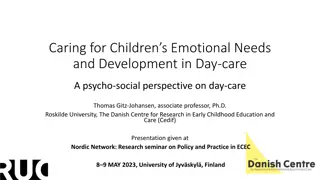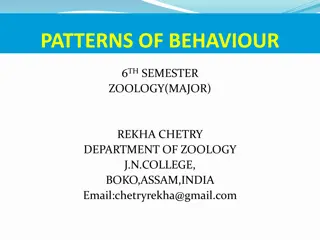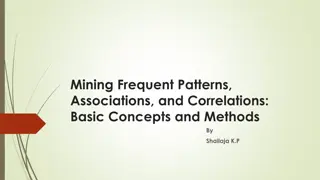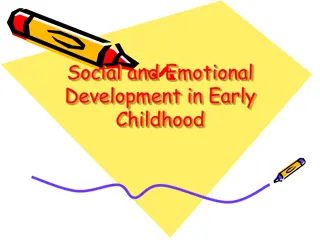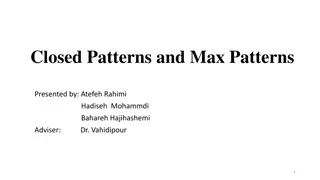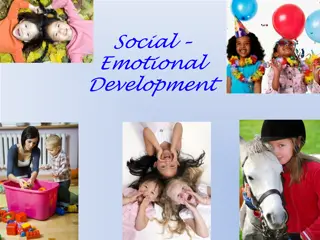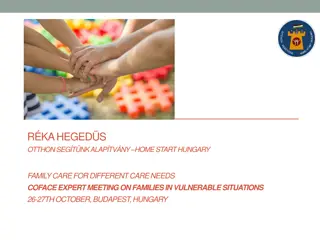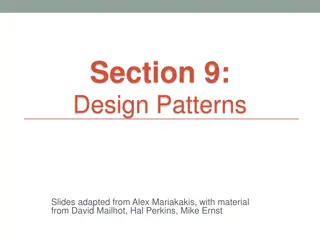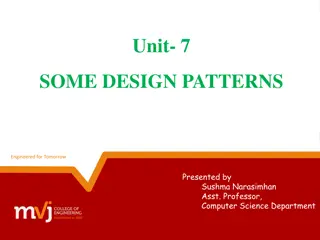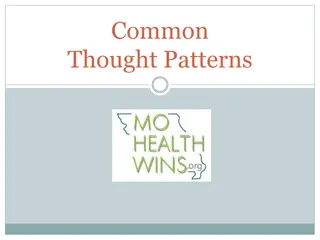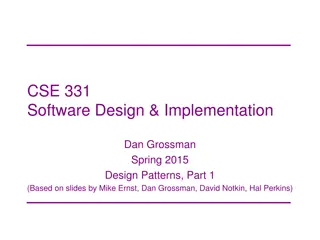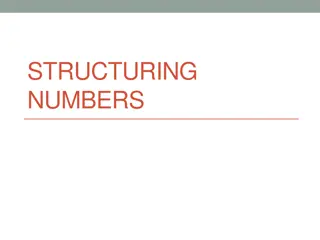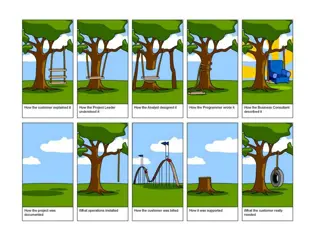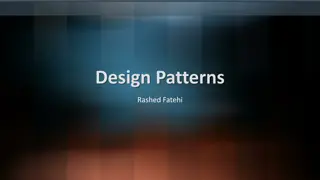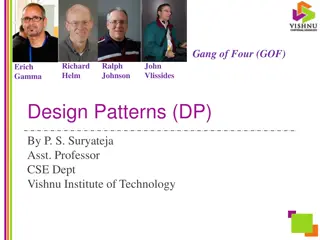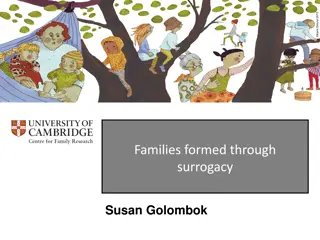Understanding Emotional Patterns in Families
Families play a crucial role in shaping individuals' emotional responses and behaviors. Caregivers influence how we perceive and manage emotions, impacting our emotional well-being. By examining how different emotions are accepted, rejected, and modeled within families, one can gain insights into their own emotional patterns and coping mechanisms.
Download Presentation

Please find below an Image/Link to download the presentation.
The content on the website is provided AS IS for your information and personal use only. It may not be sold, licensed, or shared on other websites without obtaining consent from the author. Download presentation by click this link. If you encounter any issues during the download, it is possible that the publisher has removed the file from their server.
E N D
Presentation Transcript
a very brief very brief introduction to some psychological concepts related to family along with some simple questions to get you thinking about how these concepts apply to you University of Nebraska University of Nebraska Lincoln | Counseling and Psychological Services Lincoln | Counseling and Psychological Services
TA B L E O F C O N T E N T S 1. Families help us learn about our emotions (3 & 4) 2. Families teach us how to relate ( attachment styles ) (5 & 6) 3. Goodness-of-fit within your family (7) 4. What is getting passed down behaviorally? (8) 5. Adapting to living in your family, then adapting to life more widely (9) 6. No such thing as a perfect family (10) 7. Society the big family (11) 8. Some disclaimers (college, adoption, culture, irreconcilable family differences) (12) 9. UNL CAPS information (13)
O U R PA R E N T S H E L P U S L E A R N A B O U T O U R E M OT I O N S Emotions aren t objective our mind notices our bodily sensations and decides what they mean and how they need to be reacted to From birth, our caregivers teach us what emotions we are feeling, and whether it s okay to have that emotion or not For instance, if your family thinks it s okay to feel happiness but not sadness, you might stop letting yourself feel For instance, if your family thinks it s okay to feel happiness but not sadness, you might stop letting yourself feel sad. This doesn t always make the sadness go away, though, it may just mean you have less go sad. This doesn t always make the sadness go away, though, it may just mean you have less go- -to tools for working through sadness when it comes up working through sadness when it comes up to tools for Our caregivers also model for us how to deal with different emotions For instance, if you regularly see your parent lash out when they feel scared, you might start lashing out when For instance, if you regularly see your parent lash out when they feel scared, you might start lashing out when you you feel scared. If you see your parent get support when they feel scared, you might learn to seek support too feel scared. If you see your parent get support when they feel scared, you might learn to seek support too
W H AT E M OT I O N A L PAT T E R N S D I D YO U A B S O R B ? ( Q U E S T I O N S TO C O N S I D E R ) Let s look at sadness, fear, anger, anxiety, and joy (some core emotions): Which of these emotions did your family accept or encourage? Which of these emotions did your family judge or reject? Parents teach kids how to deal with emotions: both through giving advice but also through modeling What advice have you gotten from your parents around how to deal with these different emotions? Which of these emotions have you seen your parents display, and how have you seen them deal with these emotions? Basically, how did experiences in your family teach you to deal with each of these emotions when they came up? Some examples: Some people hit things when they get angry, others get mad at themselves when they feel Some examples: Some people hit things when they get angry, others get mad at themselves when they feel anger. Some people respond to anxiety by filling their day with tasks, others respond by going for a walk or anger. Some people respond to anxiety by filling their day with tasks, others respond by going for a walk or talking to a friend. If you saw your parents use a particular strategy, you re more likely to use it talking to a friend. If you saw your parents use a particular strategy, you re more likely to use it
O U R FA M I L I E S T E A C H U S H O W TO R E L AT E ( AT TA C H M E N T S T Y L E S ) When we re very young, we re too weak to take care of ourselves so we choose one person (primary caregiver) to meet our needs for us. Knowing that this person is available and is able to help soothe us means we can drop our guard and feel comfortable exploring the world around us. Being around this person as a baby is soothing, and this ultimately teaches us how to soothe ourselves Having a caregiver who is good enough at being there for us helps us develop secure ways of relating to others (secure attachment style). We feel able to both connect with and be independent from others If our caregiver couldn t meet these needs well, we may develop insecure ways of relating to others (insecure attachment style). There are two main ways of being insecurely attached: We might turn down the volume on our longing for attachment, deciding we don t need the caregiver and thus distancing We might turn down the volume on our longing for attachment, deciding we don t need the caregiver and thus distancing ourselves from them. This becomes an ourselves from them. This becomes an avoidant attachment style avoidant attachment style, where we might run away from intimacy in general We might turn up the volume our longing for attachment, amplifying our needs to try to get attention from caregivers. This We might turn up the volume our longing for attachment, amplifying our needs to try to get attention from caregivers. This becomes an becomes an anxious attachment style anxious attachment style, where we may need a lot of reassurance and often pursue others for that reassurance , where we may need a lot of reassurance and often pursue others for that reassurance , where we might run away from intimacy in general We might have different attachment styles with different people, or with different types of people. Attachment styles are most useful as a way of thinking about what our tendencies are, how they relate to our history, and what we need to work on. With work, these styles can change over time. This slide is written from a western, American lens, but our understanding of attachment styles and what is most adaptive varies from culture to culture
W H AT D I D Y O U I N T E R N A L I Z E A B O U T R E L AT I N G ? ( Q U E S T I O N S T O C O N S I D E R , F O R P L AT O N I C & R O M A N T I C ) Comfort and support What types of comfort and support did you receive growing up? What types of comfort and support did you receive growing up? Are you able to support and comfort yourself independently? Are you able to support and comfort yourself independently? Are you able to go to others for comfort and support? Are you able to go to others for comfort and support? Fear and discomfort What discomforts/scares you most in relationships? What discomforts/scares you most in relationships? When you re uncomfortable in a relationship, what do you do to reduce your distress? (for instance, some When you re uncomfortable in a relationship, what do you do to reduce your distress? (for instance, some people might distance themselves, some might try to become closer to others, some might do a mix) people might distance themselves, some might try to become closer to others, some might do a mix) Is there a pattern to how your relationships tend to end? (you leave, they leave, you stay longer than is healthy, mutual open conversation, etc.) What relationship styles does your culture tend to value? (independence, interdependence, codependence, etc.)
G O O D N E S S O F F I T W I T H I N YO U R FA M I LY Our temperament and personality doesn t just come from how we re raised, we re also born with some of it When we re similar to our family, they understand us better and it s easier for them to help us work through our challenges Sometimes, we re just naturally different from our family, which is poor goodness-of-fit For instance, you might be eccentric and artistic in a family of no For instance, you might be eccentric and artistic in a family of no- -nonsense lawyers. Your parents weren t artistic, so it s harder for them to value your creativity and help foster that. Or your parents might be very outgoing but you re shy, and harder for them to value your creativity and help foster that. Or your parents might be very outgoing but you re shy, and they want to push you to do things that were easy for them because they don t understand what it s like to be shy they want to push you to do things that were easy for them because they don t understand what it s like to be shy nonsense lawyers. Your parents weren t artistic, so it s It s hard to grow up in a family with poor goodness-of-fit. It can help to: a) a) Be understanding that your parents don t naturally understand you because they don t have your personality. Make Be understanding that your parents don t naturally understand you because they don t have your personality. Make space in yourself to grieve this because it s not something your parents can change space in yourself to grieve this because it s not something your parents can change b) b) Work to understand yourself and, if possible, teach your family how to best support you and your values (therapy is great Work to understand yourself and, if possible, teach your family how to best support you and your values (therapy is great for learning how to do this) for learning how to do this) c) c) Find other role models more similar to you to serve as mentors and role models (perhaps an aunt, a coach, a teacher, or a Find other role models more similar to you to serve as mentors and role models (perhaps an aunt, a coach, a teacher, or a wise friend) wise friend) There s also times where our values don t align with our family s values, which is a little different but still There s also times where our values don t align with our family s values, which is a little different but still helpful to think about as goodness helpful to think about as goodness- -of of- -fit fit
W H AT I S G E T T I N G PA S S E D D O W N B E H AV I O R A L LY ? Often, we end up wanting to (consciously or unconsciously) be like or to not be like certain people in our family, depending on our experiences with those family members. This is helpful and unhelpful in different ways. For instance, you don t want to be an alcoholic like your dad, and that fear of being like him stops you from noticing that For instance, you don t want to be an alcoholic like your dad, and that fear of being like him stops you from noticing that you re drinking too much you re drinking too much When you think about your family, what about them has inspired you? What about them do you judge? Which ways do you copy them, even if you don t want to? We don t always get to choose how we feel and what we do with it. Some people end up identifying with the oppressor, meaning they take the bad things done to them and do those things to others. This often happens with sexual, physical, or emotional abuse our mind notices that our abuser got power from doing what they did, and copies our abuser because we would rather be the aggressor than be the victim. This is part of how families pass down trauma. Awareness (and therapy!) helps us break this powerful cycle There s of course much more getting passed down than this. For instance, intergenerational trauma can influence our genetics and lead us to need to work through our ancestors trauma even if we ve never met them
A D A P TAT I O N W I T H I N V S O U T S I D E YO U R FA M I LY In mainstream American culture, the nuclear family is our main source of support growing up. Therefore, we adapt to that setting in order to best survive it However, people outside our family can be very different from people inside our family. Sometimes we get to college and realize that the behaviors that helped us adapt to our family of origin are not serving us in life outside our family. This can make college very disorienting For instance, you might become guarded due to a lot of conflict in the home, but then that guardedness stops you from For instance, you might become guarded due to a lot of conflict in the home, but then that guardedness stops you from being able to connect with others outside the home being able to connect with others outside the home What is your family of origin like overall? Loud or quiet? Conflict-avoidant or high-conflict? Emotionally expressive or not? How did you adapt in order to best interact in this setting? Which of those adaptations are helpful for you now, and which personality traits of yours do you wish were more flexible? This is also why spending more time with family (such as during school breaks) can be confusing. In college, you started deciding how you wanted to be and making changes, but then you go home and find yourself reverting to how you were before. You started adapting to college, and that makes going home confusing If you decide to have kids, in order to help them become more broadly resilient, consider giving them a wide community to interact with growing up
N O S U C H T H I N G A S A P E R F E C T FA M I LY Ideally you had good enough caregivers, but every person feels hurt from some of the misattunements that happen(ed) in their family. Families simply can t meet all our emotional needs, because they can t read our minds (and they re focused on protecting us from external threats, meeting some of their own needs, etc.). The process of realizing this is an important part of our development, one that is natural to struggle with By attunement, we re talking about other people being aware of and responding to our emotions By attunement, we re talking about other people being aware of and responding to our emotions appropriately, and appropriately, and misattunements misattunements are those moments of missed connection are those moments of missed connection We can help family better meet our needs by learning what we ourselves need and guiding those around us, but misattunement is also just a natural part of having a separate body and mind from those around us The more that our parents are dealing with systemic stressors (e.g., working two jobs) or with their own personal challenges (e.g., divorce or mental health issues), the less capacity they sometimes have to attune to our needs
S O C I E T Y T H E B I G FA M I LY We absorb values and ways of being from our family, but also from society. Just as understanding family patterns helps us which ones we do and don t want to reinforce, understanding the surrounding culture can help you understand what sort of values you re absorbing and then decide which ones you feel are useful to you and align with your values Here are examples of some aspects of society that, by understanding them, can better help you understand your own perspective on life: Media: whoever put together a show or song has their own values, and we absorb these. What are these values? What tactics Media: whoever put together a show or song has their own values, and we absorb these. What are these values? What tactics are they using to sell us the show or song? (This can also be applied to the news, advertisements, and social media) are they using to sell us the show or song? (This can also be applied to the news, advertisements, and social media) Societal events: for instance, school shootings, climate change, and political policies all influence how we interact with th Societal events: for instance, school shootings, climate change, and political policies all influence how we interact with the e world (and how your family chose to interact with you) world (and how your family chose to interact with you) We are absorbing messages from society constantly, whether we like it or not: That s why even a boy whose parents encourage him to express emotions is simultaneously getting messaging that That s why even a boy whose parents encourage him to express emotions is simultaneously getting messaging that certain emotions are weak or not okay to have. Or, if you see someone on the news deal with their pain through certain emotions are weak or not okay to have. Or, if you see someone on the news deal with their pain through hurting others, you are more likely to decide this is a possible path for you hurting others, you are more likely to decide this is a possible path for you However, being aware of what we re absorbing from others allows us more freedom to decide who we want to be and to make efforts to do that
S O M E D I S C L A I M E R S It s normal to be confused about yourself and your family when you re in college When you get to college, you see a lot of different ways of being and acting. When you were growing up, family taught you wha When you get to college, you see a lot of different ways of being and acting. When you were growing up, family taught you what w you re an adult being put in situations where you need to decide for yourself what you re an adult being put in situations where you need to decide for yourself what you experimentation, you ll be figuring out which values to keep, which to modify, and which to discard experimentation, you ll be figuring out which values to keep, which to modify, and which to discard This can be a challenging time, but know that it is a completely normal part of adulting. Basically, whether you like it or This can be a challenging time, but know that it is a completely normal part of adulting. Basically, whether you like it or no and you re responsible for own life and you re responsible for own life t was important. Now as important. Now you think is important. Through thought, conversation, and think is important. Through thought, conversation, and not, your life has changed t, your life has changed Adoption/alternative family structures (including divorce) are relevant to development Family and caregivers are used interchangeably in this Family and caregivers are used interchangeably in this powerpoint when the strongest subconscious patterns get absorbed, but you still learn a lot from whoever you are living with at differen when the strongest subconscious patterns get absorbed, but you still learn a lot from whoever you are living with at different s If you switched families (or family structures) during childhood, an additional question to ask yourself is whether you were If you switched families (or family structures) during childhood, an additional question to ask yourself is whether you were giv losses you endured. Caregivers often have trouble providing this space for their child because they were at a point of transi losses you endured. Caregivers often have trouble providing this space for their child because they were at a point of transitio now as an adult you need to make time to process the loss (therapy can help with this) now as an adult you need to make time to process the loss (therapy can help with this) powerpoint. If you have a more complicated family story, just know that ages 0 . If you have a more complicated family story, just know that ages 0- -3 are 3 are t stages growing up tages growing up given space to grieve the en space to grieve the tion, too. It may be that n, too. It may be that Cultural differences are challenging Multicultural family dynamics would require a whole other Multicultural family dynamics would require a whole other powerpoint agree on what is or should be a normal way to be raised or to behave. For instance, what we legally call abuse here may be agree on what is or should be a normal way to be raised or to behave. For instance, what we legally call abuse here may be a n discipline in your parents home country, or rules around how to socialize with people outside the family may vary substantia discipline in your parents home country, or rules around how to socialize with people outside the family may vary substantially powerpoint. It can become confusing or even impossible for multicultural families to . It can become confusing or even impossible for multicultural families to a normal form of ormal form of lly Do you have irreconcilable differences with your family? Sometimes we are very different from our family. Complicated decisions (such as whether to come out as queer and risk family Sometimes we are very different from our family. Complicated decisions (such as whether to come out as queer and risk family con political differences are worth cutting off contact) have no right answer. We all absorb narratives like family first or b political differences are worth cutting off contact) have no right answer. We all absorb narratives like family first or be t can be very confusing. It is up to you and only you to decide what is most important to you. can be very confusing. It is up to you and only you to decide what is most important to you. Just know that life can be very hard without support from your family, so if you choose that route, try to develop another co Just know that life can be very hard without support from your family, so if you choose that route, try to develop another commu for you instead for you instead conflict, or whether flict, or whether e true to yourself, and they rue to yourself, and they mmunity that can be there nity that can be there
T H A N K YO U ! If you d like to connect with Counseling and Psychological Services (CAPS), we re here for you (for free!) Individual Counseling Individual Counseling Go online to schedule an appointment on the morning of the day you want to be seen: https://caps.unl.edu/how-schedule-online-appointment For 24/7 crisis line, call our front desk at (402) 472-7450 and press 4 Let s Talk Let s Talk Chat informally with a professional from CAPS. Learn more at https://caps.unl.edu/lets-talk Virtual sessions are available by appointment. In-person sessions available through TRIO or Military & Veteran Success Center. Counseling and Psychological Services | Located in the University Health Center, Level Two


